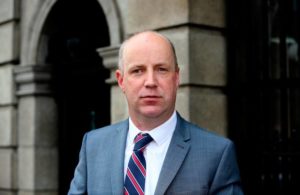
The last rites

In fact, there’s no-one on the face of the earth with the same pulling power as the Pope, not a sportsman, a celebrity or a musician capable of bringing Irish people together like the head of the Catholic Church. And whereas Brooks or Beyoncé might play a few tunes, Ronaldo or Messi score a few goals, this man, this elderly Argentinean man, has no particular talent, he won’t sing or dance, dribble or shoot, he’s just going to talk, pray a bit, and be on his way. Yes, the content of his sermon, what he chooses to address, what he chooses not to, will be of great importance. But you could just as easily watch it on television, read about it the next day.
No, for those in attendance, this will be one of those ‘I was there’ events, an occasion not to be missed. The long walk to and from the venue, the wait for public transport, the crowds, the clamour and the chaos, will all be worth it once his Holiness emerges from the Popemobile. And for those who arrive early, camp out, there could be an opportunity to touch, or maybe even speak with, him. Non-believers may scoff, but to those of faith this is the equivalent of Elvis rising from the dead, pulling on the old jumpsuit, and doing a duet with Bono.
To mark this historic visit, last weekend the Sunday Independent ran a poll on Irish attitudes towards the Catholic Church. Partly motivated by President Mary McAleese’s recent salvo on the church, in which she accused it of being the “primal global carrier of the virus of misogyny”, the poll asked voters whether they agreed with Mrs McAleese. Surprisingly, 55 per cent said they did, with just 15 per cent disagreeing with the former president – the remaining 30per cent obviously felt the question was far too nuanced to merit a worthwhile response. Regardless, those are some striking figures. To put it bluntly; more than half of Irish people view the Catholic Church as having an ingrained prejudice against women, with less than one in six willing to stick their neck out and say that it treats both genders equally.

Yet it was the last two questions in the poll which proved most telling. Voters answered yes when asked whether they were in favour of female priests (62 per cent) and yes when asked whether priests should be allowed to marry (67 per cent). More than anything, more than the throngs of people heading to Dublin, more than the tacky memorabilia, more even than the planned demonstrations taking place on the same day, those responses signify modern Irish attitudes towards Catholicism. Sure, when there’s half of million people stretched out on the grass on August 26 it’ll be easy to imagine that things are the same as they ever were, that this great show of unity and strength proves once and for all that Ireland remains a stronghold for the Vatican, a nation of devout believers to the last.
But, without wishing to be accused of ageism, there’s a reason why the Office of Public Works (OPW) is installing rest zones at regular intervals along the walking routes, and why it’s allowing portable seating to be brought into the venue. Because this event, unlike those in 1979, will mostly be attended by our elder generations; indeed there’s a good chance that many who saw the Pope 39 years ago will do so again this time around. That’s not to suggest that no-one under the age of 60 will be present, I’m sure there will be, but they will be in the vast minority, many only travelling to chaperone older relatives.
The church, in its current guise, is largely irrelevant to those born since the last papal visit, with its views and policies considered more outdated with each passing year. And, in many ways, this represents a last hurrah for the papacy on these shores, a farewell tour of sorts, one last chance to see the band in action before they separate for good. You may argue otherwise, but ask yourself this: if it’s another forty years before the Pope comes again, how many people will be in attendance next time? I can safely say that it won’t be half a million, or anything like it. Chances are that, by the year 2058, a visit from the head of the Catholic Church will barely fill the Aviva, never mind Croke Park. Unless somehow, this time around, the current incumbent can properly address the questions which continue to gnaw away at us, the issues which ensure that, for many, the church, and all it stands for, is forever tainted.

If he doesn’t, if he chooses to preach to the converted and give the people what they want, then he will sound the death knell for his successors. He will squander the last chance the Catholic Church has to repent for its sins and guarantee that this will be the last time a Pope is welcomed so warmly to our shores.
The doctor will attempt to see you now, but we’re not promising anything

Have you ever tried video calling someone using substandard broadband? It’s not fun. If you’re lucky you might just be able to make out something resembling a face and hear every fifth word. And then, just when you’re getting to the crux of the matter, when you’re learning to communicate through broken, fragmented English, the screen will go dark and the call will end abruptly. You immediately try again, shouting, “can you hear me?” with increasing frustration, before giving up, consoling yourself with the knowledge that someday, maybe in a few years, you might see this person again.
Now imagine going through that ordeal while in the midst of an anxiety attack or in a state of deep depression? It would hardly improve your mood, if anything it would exacerbate your condition. Yet, in searching for a solution to the lack of psychiatric consultants available in this country, Minister for Mental Health, Jim Daly, has proposed that we move with the times and implement ‘web therapy’ services throughout the land.
In addition to a dedicated phone line and text service, the Minister wants to roll out online counselling for those either unable or unwilling to access face-to-face services. This would involve patients video chatting with qualified professionals, whereby they can then be admitted to inpatient units or emergency departments if so required.
In theory it’s a good idea, and it has worked to great effect in the United States. However, someone might need to remind Deputy Daly that not everyone in this country has broadband or Wi-Fi capable of facilitating video calls, that large swathes of the population can barely send an email never mind use Skype. Is he even aware of the crisis surrounding the National Broadband Plan? Or he is just choosing to ignore it, hoping to get a pat on the back for a solid suggestion which, although completely unrealistic, shows just how forward-thinking and innovative he really is? Something tells me it’s the latter.









